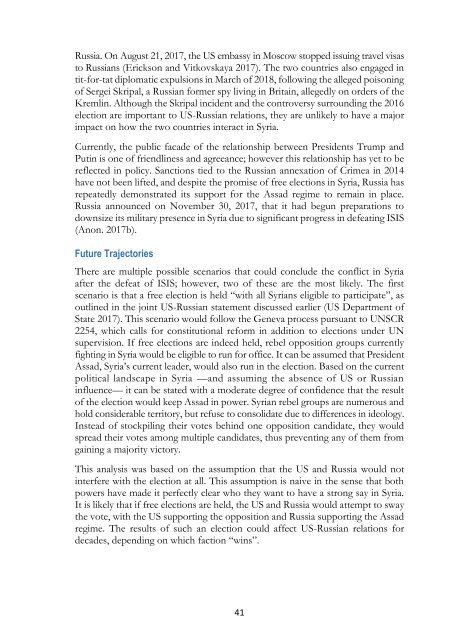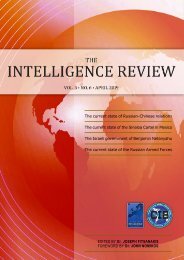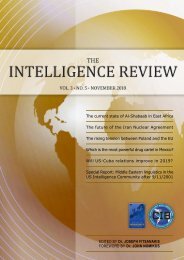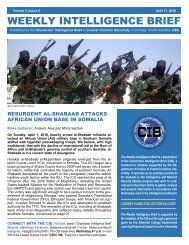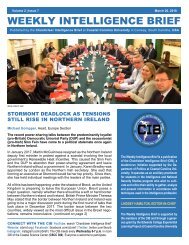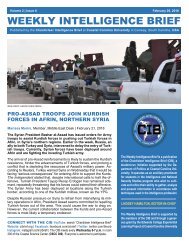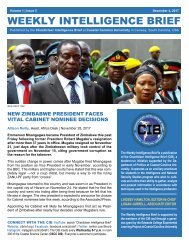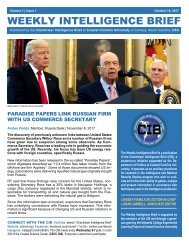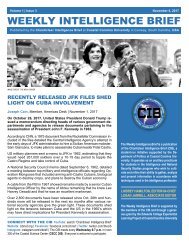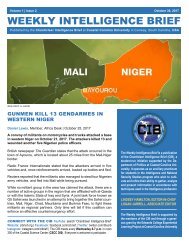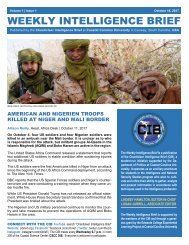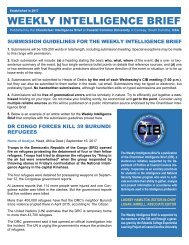The Intelligence Review | volume 2 | issue 4 |
This volume is the product of a collaboration between the European Intelligence Academy (EIA) and the Chanticleer Intelligence Brief (CIB), a student-run initiative supported by the Department of Politics at Coastal Carolina University in Conway, South Carolina, United States. Four CIB analysts tackle some of the most pressing and timely questions confronting intelligence observers today. Topics in this volume include the possibility of a war with North Korea, and the rise of far-right militancy in the United States. The volume also includes an assessment of the impact of the Islamic State in the relations between Russia and the United States, and a discussion of Turkish politics and its effect on NATO's cohesion.
This volume is the product of a collaboration between the European Intelligence Academy (EIA) and the Chanticleer Intelligence Brief (CIB), a student-run initiative supported by the Department of Politics at Coastal Carolina University in Conway, South Carolina, United States. Four CIB analysts tackle some of the most pressing and timely questions confronting intelligence observers today. Topics in this volume include the possibility of a war with North Korea, and the rise of far-right militancy in the United States. The volume also includes an assessment of the impact of the Islamic State in the relations between Russia and the United States, and a discussion of Turkish politics and its effect on NATO's cohesion.
You also want an ePaper? Increase the reach of your titles
YUMPU automatically turns print PDFs into web optimized ePapers that Google loves.
Russia. On August 21, 2017, the US embassy in Moscow stopped issuing travel visas<br />
to Russians (Erickson and Vitkovskaya 2017). <strong>The</strong> two countries also engaged in<br />
tit-for-tat diplomatic expulsions in March of 2018, following the alleged poisoning<br />
of Sergei Skripal, a Russian former spy living in Britain, allegedly on orders of the<br />
Kremlin. Although the Skripal incident and the controversy surrounding the 2016<br />
election are important to US-Russian relations, they are unlikely to have a major<br />
impact on how the two countries interact in Syria.<br />
Currently, the public facade of the relationship between Presidents Trump and<br />
Putin is one of friendliness and agreeance; however this relationship has yet to be<br />
reflected in policy. Sanctions tied to the Russian annexation of Crimea in 2014<br />
have not been lifted, and despite the promise of free elections in Syria, Russia has<br />
repeatedly demonstrated its support for the Assad regime to remain in place.<br />
Russia announced on November 30, 2017, that it had begun preparations to<br />
downsize its military presence in Syria due to significant progress in defeating ISIS<br />
(Anon. 2017b).<br />
Future Trajectories<br />
<strong>The</strong>re are multiple possible scenarios that could conclude the conflict in Syria<br />
after the defeat of ISIS; however, two of these are the most likely. <strong>The</strong> first<br />
scenario is that a free election is held “with all Syrians eligible to participate”, as<br />
outlined in the joint US-Russian statement discussed earlier (US Department of<br />
State 2017). This scenario would follow the Geneva process pursuant to UNSCR<br />
2254, which calls for constitutional reform in addition to elections under UN<br />
supervision. If free elections are indeed held, rebel opposition groups currently<br />
fighting in Syria would be eligible to run for office. It can be assumed that President<br />
Assad, Syria’s current leader, would also run in the election. Based on the current<br />
political landscape in Syria —and assuming the absence of US or Russian<br />
influence— it can be stated with a moderate degree of confidence that the result<br />
of the election would keep Assad in power. Syrian rebel groups are numerous and<br />
hold considerable territory, but refuse to consolidate due to differences in ideology.<br />
Instead of stockpiling their votes behind one opposition candidate, they would<br />
spread their votes among multiple candidates, thus preventing any of them from<br />
gaining a majority victory.<br />
This analysis was based on the assumption that the US and Russia would not<br />
interfere with the election at all. This assumption is naive in the sense that both<br />
powers have made it perfectly clear who they want to have a strong say in Syria.<br />
It is likely that if free elections are held, the US and Russia would attempt to sway<br />
the vote, with the US supporting the opposition and Russia supporting the Assad<br />
regime. <strong>The</strong> results of such an election could affect US-Russian relations for<br />
decades, depending on which faction “wins”.<br />
41


